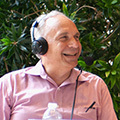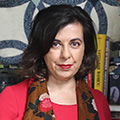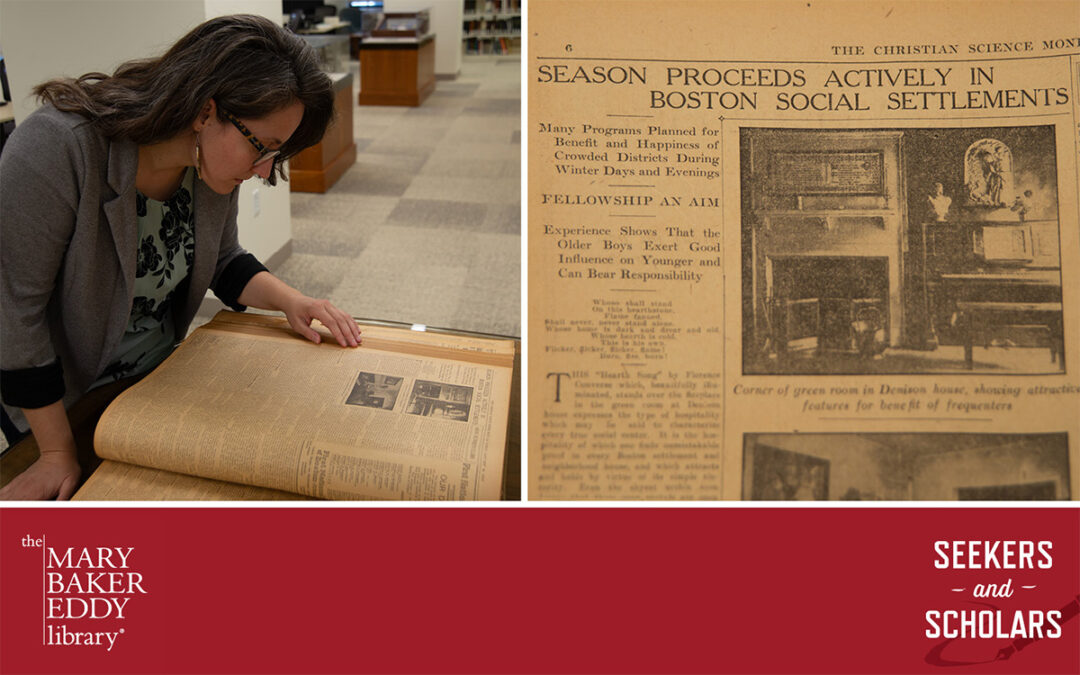For many readers, The Christian Science Monitor is best known for its international focus and values-based approach. But in the Monitor’s earliest years, it also gave significant attention to events and developments in its home city of Boston—which was undergoing major demographic changes around the time of the newspaper’s 1908 founding, in the middle of the Progressive Era. One of the developing forms of social service was an institution known as the settlement house, an educational initiative designed to help new immigrants adapt to and succeed in American society.
What did the Monitor’s frequent coverage of Boston’s settlement houses indicate about its values? And how do these values reflect the views and teachings of Christian Science founder Mary Baker Eddy, who also established the paper? Seekers and Scholars host Jonathon Eder joins the program as a guest, along with Dr. Laura Prieto, former Professor of History and Chair of Public Humanities at Simmons University. They explore this fascinating piece of American social history and the Monitor’s contribution to it.
Access more on this topic:
 Jonathon Eder is Manager of Programs and Scholarly Engagement for The Mary Baker Eddy Library. He has been with the Library since its 2002 opening, serving in a number of capacities, including exhibit development and library reference services, in addition to programming. He has made scholarly contributions on Christian Science history to journals and book volumes, among them “Mary Burt Messer—Christian Science Healer as Sociologist and Scholar,” a chapter in Challenging Bias against Women Academics in Religion (Chicago: Atla Open Press, 2021).
Jonathon Eder is Manager of Programs and Scholarly Engagement for The Mary Baker Eddy Library. He has been with the Library since its 2002 opening, serving in a number of capacities, including exhibit development and library reference services, in addition to programming. He has made scholarly contributions on Christian Science history to journals and book volumes, among them “Mary Burt Messer—Christian Science Healer as Sociologist and Scholar,” a chapter in Challenging Bias against Women Academics in Religion (Chicago: Atla Open Press, 2021).
 Dr. Laura R. Prieto is Program Director for Our Bodies Ourselves Today and Scholar-in-Residence at the Center for Women’s Health and Human Rights at Suffolk University. She was a longtime professor of history and chair of public humanities at Simmons University, a role in which she led multiple initiatives. One of these included the Mary Eliza Project, a collaboration with the Boston City Archives to digitize the records of over 50,000 women who registered to vote shortly after the passage of the Nineteenth Amendment. Prieto has also been a research associate in the Women’s Studies in Religion Program at Harvard Divinity School. She has published widely on women and gender in American history and culture, from visual artists to nurses to missionaries to beauty contestants.
Dr. Laura R. Prieto is Program Director for Our Bodies Ourselves Today and Scholar-in-Residence at the Center for Women’s Health and Human Rights at Suffolk University. She was a longtime professor of history and chair of public humanities at Simmons University, a role in which she led multiple initiatives. One of these included the Mary Eliza Project, a collaboration with the Boston City Archives to digitize the records of over 50,000 women who registered to vote shortly after the passage of the Nineteenth Amendment. Prieto has also been a research associate in the Women’s Studies in Religion Program at Harvard Divinity School. She has published widely on women and gender in American history and culture, from visual artists to nurses to missionaries to beauty contestants.



